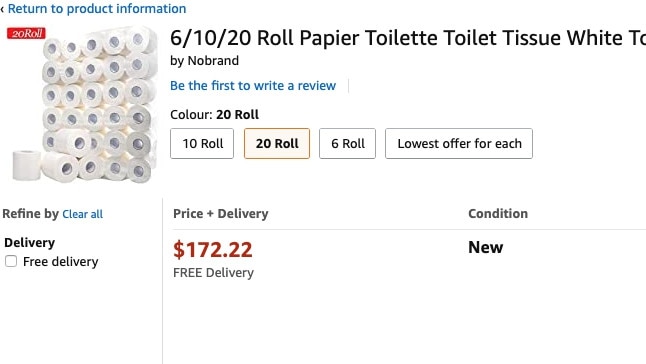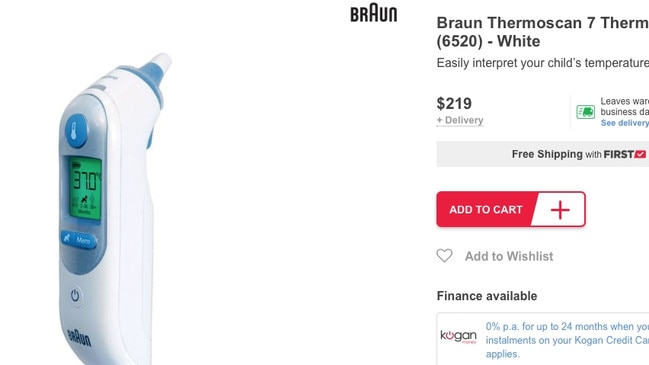Pandemic price-gouging is rising in Australia, experts warn, for gym gear, whitegoods, face masks
Hundreds of dollars are being added to products amid claims unscrupulous businesses and private sellers are exploiting Australian shoppers during the coronavirus pandemic.
Coronavirus
Don't miss out on the headlines from Coronavirus. Followed categories will be added to My News.
- Property buyers put straight onto hardship provisions
- How drones could be used in the war on COVID-19
Hundreds of dollars are being added to the price of everything from home workout equipment to whitegoods in Australia amid claims unscrupulous businesses and private sellers are exploiting Australian shoppers during the coronavirus pandemic.
Massive mark-ups online have led to prices of more than $50 for liquid soap, $48 for a disposable face mask, $269 for dishwashing liquid, and rusty dumbbells with asking prices of $200.
Even thermometers are being sold for double their normal asking price in some online stores.
Consumer and retail experts have slammed the practice as “unethical” and say while it might not be illegal, consumers will not return to companies and brands doing the wrong thing.

Choice campaigns and communications director Erin Turner said the organisation was currently investigating pandemic price-gouging after seeing multiple reports of price rises over the past month.
She said there were two types of exploitation: retailers taking advantage of high demands and individuals using digital platforms to list goods at outrageous prices.
“We’ve seen a mix of retailers and individuals try to take advantage of the situation on goods that people really value, whether that’s hand sanitiser, face masks, or gym equipment,” she said.
“We’ve been assessing the various policies of companies like eBay, Facebook and other online marketplaces and we think they should be much stronger on this. Big international companies with big international budgets should be able to quickly take down these posts.”
But Ms Turner said while raising prices could have terrible consequences for consumers and supply, the practice was not illegal.
“Choice’s position is that it is deeply unethical,” she said. “It is taking advantage of people at a time when we are all really vulnerable.”
News Corp has seen Facebook Marketplace ads asking $200 for rusty dumbbells, for example, and eBay Australia listings asking $52 for a bottle of liquid hand wash.
Alarming ads on Amazon’s Australian website included $269 for two bottles of dishwashing liquid, 20 rolls of toilet paper for $172, and a $190 Reebok medicine ball.

Kogan’s online store also featured a number of unusually high-priced items, including a dumbbell for $599 that could be purchased for $295 elsewhere, a Braun thermometer offered at double the price of other stores, and a 198L freezer for $1499 even though competing models cost less than $500.
A spokeswoman for the Australian Competition and Consumer Commission said the watchdog was looking at allegations of unfair price rises, even though it had “no direct enforcement power”.
“In some limited circumstances, excessive pricing may be unconscionable where it is extreme and targets particularly vulnerable consumers,” she said.
“The ACCC will look at any systemic conduct and is working with online marketplaces such as Gumtree, eBay, Amazon and Facebook to ensure they are doing what they can to disrupt individuals seeking to sell certain essential items at excessive prices.”
An eBay Australia spokeswoman said the company had removed “hundreds of thousands of listings and blocked million from appearing on the platform” to reduce attempt to fleece consumers.
The selling platform also restricted the sale of face masks, hand sanitiser, toilet paper and baby formula “to business sellers,” she said.
Gartner global retail principal research analyst Thomas O’Connor said raising the price of goods during a pandemic was “not a very good look for any brand” and stores seen to be doing this would not win repeat customers.
“In this kind of market, there will be businesses who do price-gouge,” he said. “The reality is it won’t help them in the long-term. It will negatively impact their brand in the long-term.”
Mr O’Connor said consumers should be aware that the price of some grocery items had risen during the pandemic due to shortages, making it harder to identify when the price of goods had been raised unfairly.
Originally published as Pandemic price-gouging is rising in Australia, experts warn, for gym gear, whitegoods, face masks

